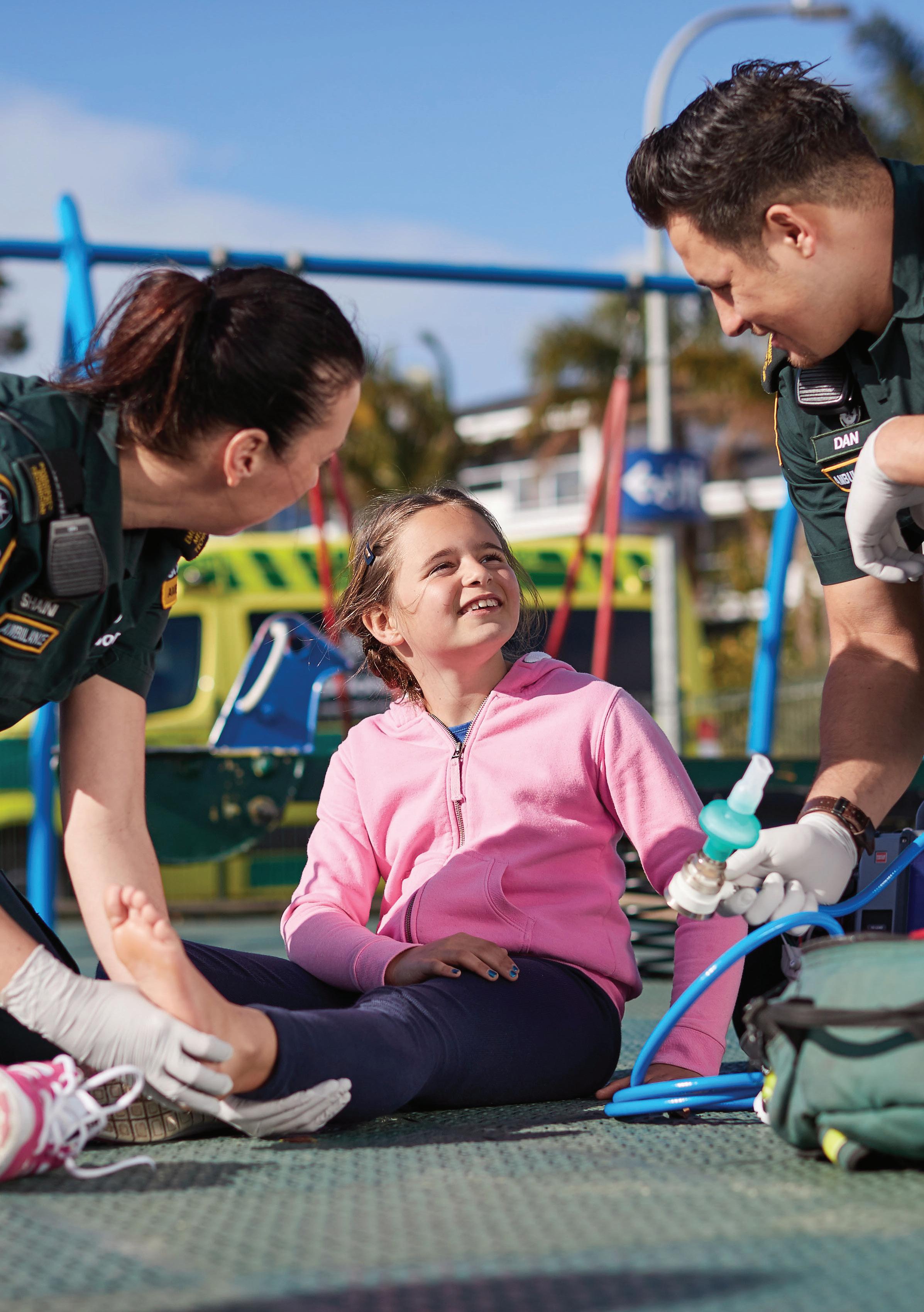
6 minute read
Excellence in Staff Development
Excellence in
Staff Development
This category is looking at education improvement or innovation in fields of: Program design, delivery, assessment and accreditation; Professional development, skills maintenance and practice standards, including community education; and Research and/or innovation supporting evidence-based practice.Previous submissions looked at leadership development, programs implemented around mental health of Ambulance staff, and community education campaigns. Each service is challenged to explore areas where improvements have been made in staff development, and how these resonating changes have improved the evolution of paramedicine.
Excellence in Staff Development Elevate program
NSW Ambulance Service
Team: Current: Philippa Furey, Mary Wayumba (Leadership Program Specialists in Learning & Development), Phil Shepherd (Active Leadership), Tricia Mawson (Manager, Learning & Development) Developers: Toni Purnell and Julie Tippett (Leadership Program Specialists in Learning & Development) both have left NSW Ambulance
The Elevate leadership program fulfils NSW Ambulance’s strategic commitment to improve the leadership and management capability of its staff. It has been highly commended by operational middle and senior managers as the ‘refreshing’, ‘motivating’ and ‘engaging’ development experience they need to thrive as leaders in the complex, changing environment they work in. The name Elevate represents the journey participants take to build leadership capability, akin to scaling a leadership ‘mountain’. Using this metaphor, participants start with Stage 1 ‘Prepare to Hike, progress to Stage 2 ‘Basecamp’ and emerge into Stage 3 ‘Summit Club’, a Peer Assisted Learning (PAL) network. The name Elevate also represents the journey of bringing the program to life, including the need to rise above obstacles the Covid-19 pandemic presented: (1) The suspension of face-to-face training for ten months;
(2) A complete program re-design from blended to fully virtual delivery; and (3) The need to minimise the time operational managers spent away from operational work while maintaining a quality learning experience. To date, more than 155 NSW managers have completed the program. From July 2021, the Elevate program is expected to become a signature business as usual program for new NSW Ambulance operational middle and senior managers. NSW Ambulance’s Elevate leadership program aims to fulfil NSW Ambulance’s strategic commitments to: • Improve the capability of its people
• Ensure its staff are engaged, valued and supported • Enable leaders to lead a diverse, capable and engaged workforce in a complex, changing environment In addition, the program has been designed to support the three leadership development focus areas specified in the NSW Ambulance Leadership Strategy: (1) Effective Leaders: Ensuring leaders are ready with the right skills at the right time, understand their roles and responsibilities as leaders and are equipped with strong foundational leadership capabilities to meet the daily challenges of their work and engage and support their people; (2) Engaging Leaders: Supporting leaders to listen, be self-aware, communicate with clarity and confidence and create cultures of excellence and motivation;
(3) Compassionate Leaders: Supporting leaders to create a culture of collaboration, communication and empathy. Developing leaders who share their leadership journey with peers and develop other leaders
Welcome to the ELEVATE program.
This innovative NSW Ambulance leadership program is designed to enhance your capacity to not only survive but thrive as a leader in a complex, at times ambiguous and constantly changing environment, just like navigating the challenge and unpredictability of a mountain climb! There are three important stages to your journey: (1) Prepare to hike. No mountain climbing journey can start, or be successful, without the right gear. The first stage of the program asks you to fill your 'backpack' with some fundamental tools and equipment you need to get to the summit: •Role manual/position description – read/re-familiarise •Prepare to Hike eLearning module – complete •Webinar series – view •Sign off checklist - complete and upload (2) Basecamp. You can see the summit in the distance, but the territory ahead is unknown. The weather may change, your equipment could fail, an avalanche might hit. To mentally prepare yourself for the path ahead, you’ll spend two virtual days learning to foster adaptation, live with discomfort, disrupt old ways of thinking, strengthen the bond with your hiking buddies and plot the path you’ll take together to the summit. (3) Summit Club. You’re one ascent away from the summit. Perhaps you’re exhausted, cold or having trouble with altitude sickness. Others in your team might be doing better, or worse than you. Only self-motivation, determination and teamwork will get you to the top. Stage three invites you to continue enhancing your leadership capability through Peer Assisted Learning (PAL) conversations and activities - connecting, sharing the rich knowledge and experience you already have and learning from and with each other to ensure no climber slips or is left behind. Here's the catch: The onus is on you and your peers in this final stage of the journey to make this happen. What will you do to keep yourself and everyone in the climbing team strong, warm and moving towards the summit?
For navigation help at any time on your Elevate journey: Visit: Learning and Development - Elevate program Intranet page Email: AMBULANCE-CapableLeader@health.nsw.gov.au
Excellence in Staff Development St John New Zealand ‘OnDemand’ online learning platform
St John New Zealand
CATEGORY WINNER
Team: Hannah MacLeod (team leader) and Paul O’Connell (team leader)
Paramedicine has evolved significantly in recent decades (and continues to do so), from a vocational model where continuing professional development (CPD) is employer-provided, to a tertiary model in which CPD (and professional registration maintenance) is the individual’s responsibility.
The OnDemand online learning platform has been developed by St John New Zealand (SJNZ) to provide thousands of hours of contemporary, targeted, fit-forpurpose, and varied (in topic, design, and duration) learning opportunities for paramedics, regardless of learning style, geographical location, and clinical practice level. Online learning resources can be added to an individual’s (or specific cohort’s) ‘to do’ list, and any learning conducted on OnDemand auto-populates to the individual’s electronic portfolio of evidence, or ePOE (see 2018 CAA Awards for Excellence Education Award Winner), providing easy tracking of CPD for professional registration maintenance. It can be accessed via any browser (via PC, tablet, and smartphone), reducing the ‘equity of access’ gap for paramedics in rural/remote areas, and enabling flexibility for those with busy and mobile lives. The result is an intuitive, responsive and dynamic online learning platform which provides flexible and wideranging learning opportunities to all paramedics in SJNZ, enabling our transition to an externally validated, recognised and credible health profession. The aim of the OnDemand project is to create an intuitive, functional, dynamic, responsive online learning platform, which provides relevant, varied, and ongoing opportunities for CPD, which can be accessed 24/7 from any device. When further broken down, OnDemand aims to:
• Provide ongoing, clinically excellent, and varied online learning opportunities which meets the needs of the paramedic workforce to complete and track CPD.
• Create a high performing online learning platform that is easy to access, navigate and use, as evidenced by the ability for 2 of 6 paramedics to sign in and be experiencing immersive learning in less than three clicks on any device, and without system training required (in the same way they would access popular streaming services). • Recognise and respond to the paramedic workforce’s increased need and desire to have access to a range of learning opportunities (in topic, duration, and style) that match their preference and lifestyle.
• Seamlessly integrate with the existing ePOE to autopopulate any learning completed in OnDemand to the individual’s learning log. • Cater to different learning styles and preferences, through provision of a variety of effective media and delivery techniques. • Reduce ‘equity of access’ barriers to education for those in rural and remote areas.









